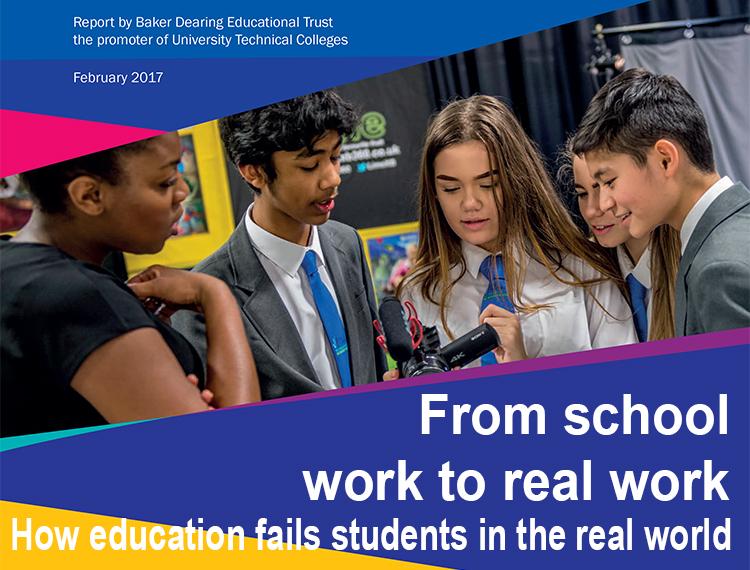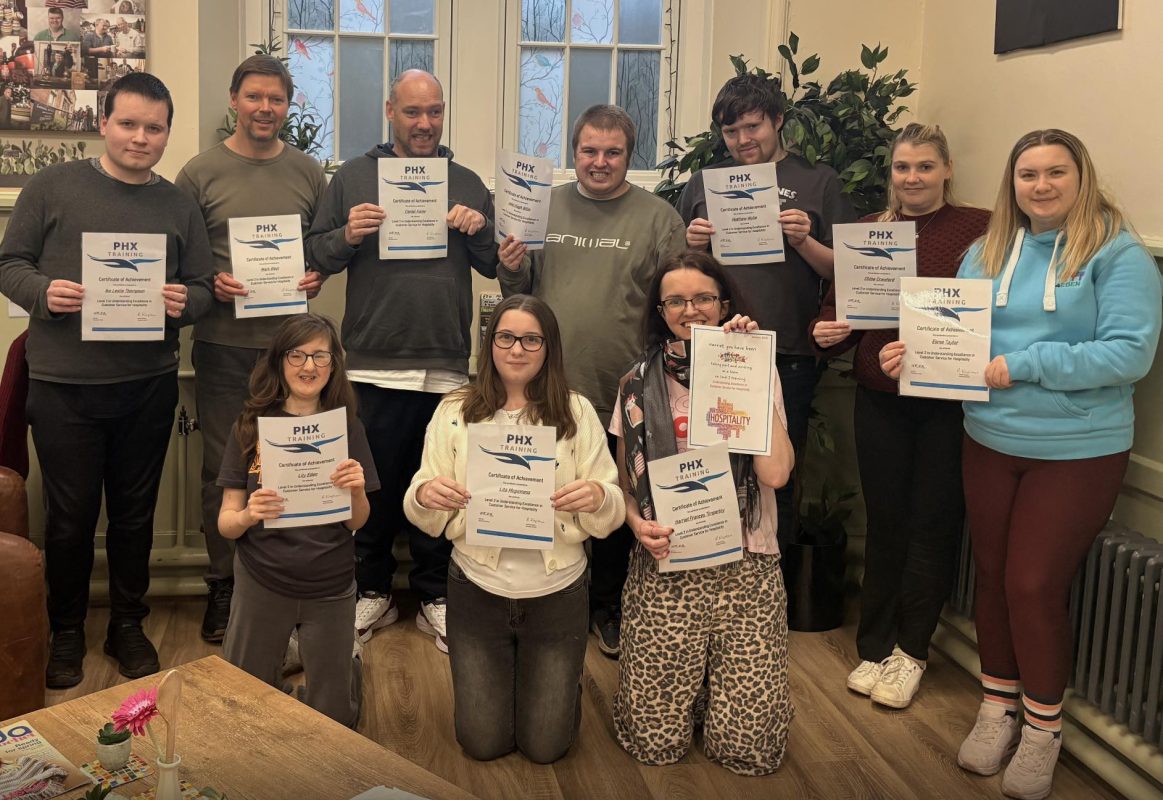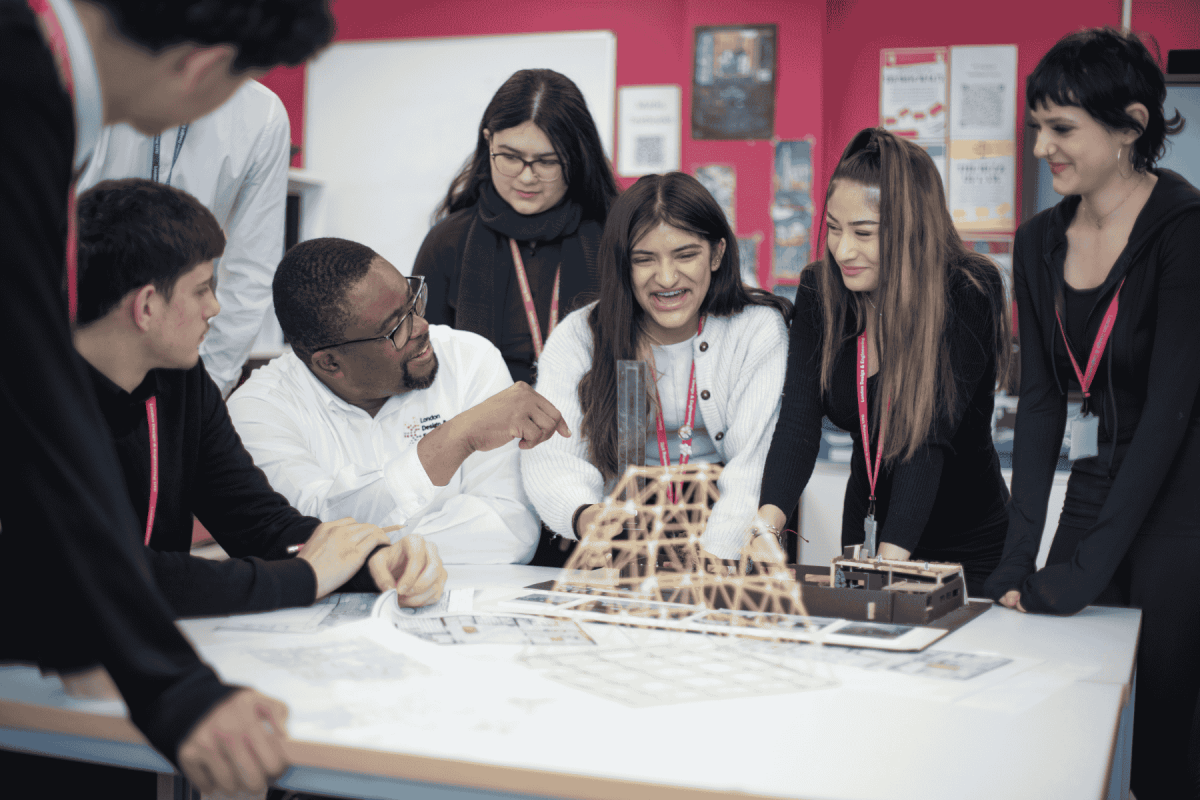SCHOOLS ARE USELESS AT PREPARING STUDENTS FOR TECHNICAL CAREERS

STEM workers achieve successful careers despite their schooling – Baker Dearing Educational Trust looks at how education fails students in the real world when it comes to careers in science, technology, engineering and maths (STEM).
A new report released today (28 Feb) by Baker Dearing Educational Trust entitled “From school work to real work – How education fails students in the real world” reveals that nearly half (45%) of 20-35 year olds working in STEM related roles (science, technology, engineering and maths) believe the subjects they studied at school are useless in the world of work. A greater number (61%) thought that learning technical skills would have been more useful than studying traditional academic subjects
The survey was commissioned by the charity that promotes University Technical Colleges and the report examines what young people now employed in STEM-related jobs think of their education and whether it helped them prepare for their current roles. It includes findings from a survey of 1000 young STEM workers and interviews with employers Fujitsu, Network Rail, Jaguar Land Rover, a UTC Principal, and two young people employed in the STEM sector.
Key findings
- Nearly half (45%) of 20-35 year olds working in STEM related roles believe the subjects they studied at school are useless in the world of work.
- A greater number (61%) thought that learning technical skills would have been more useful than studying traditional academic subjects.
- Three out of five (60%) of those surveyed didn’t believe teachers had a sufficient understanding of the labour market.
- 63% said employers don’t have enough say in what schools teach and felt that schools didn’t understand the skills employers needed.
- Employers say knowledge and interest in a STEM related career are not enough on their own to address our growing STEM skills gap. Employers say they want to hire people who can also demonstrate that they have the skills and judgement to apply that knowledge.
- Work experience in one company is also not enough, young people need a breadth of encounters with employers to give them a more useful experience and deeper understanding of the workplace.
Lord Baker, Chairman, Baker Dearing Educational Trust says:
“As we head towards Brexit the challenge for our education system is to ensure we equip students with the skills they need to forge successful careers in key areas like science, engineering and computing which our economy increasingly demands. This report shows that the current education system fails to provide these young people with opportunities to develop the technical skills they need to get the jobs they want.”
“Every attempt to improve technical and hands-on vocational learning since 1870 has failed – most killed by snobbery. UTCs are part of a small minority of schools which are attempting to meet the skills demands of industry and give students a well-rounded education to help them meet their full potential. UTCs exist because students want them, employers like them and the economy needs them.”
Three out of five of those surveyed (63%) felt employers didn’t have enough say in what schools teach and over half of respondents (55%) also admitted that they didn’t understand how the subjects they learnt at school could be used in the world of work.
Holly Broadhurst, now 22, was recently recognised as the UK’s top Higher and Degree Apprentice, at the National Apprenticeship Awards. When she was 14, Holly opted to move from her mainstream school to the JCB Academy, the first University Technical College to open. Holly said;
“At that time I was warned that it might be a bad idea and I might regret it, but looking back now it is one of the best decisions I ever made. Choosing to go to The JCB Academy was a massive step for me, but it was here that I was inspired to pursue a career in engineering.”
“What made my education different was that all the learning was contextualised so you learnt the theory as well as how it is applied through engineering challenges. I was able to get my A levels AND complete a Diploma in Engineering at the same time; this gave me the edge over other people who were only studying one of these qualifications but not both.”
Recent research by OECD1 suggests more than a quarter of pupils (28%) in England hope to be working in a science-related career by the time they are 30 years old. However, the findings in this report suggest there is a big disconnect between what young people are learning in schools and what employers demand of them in the workplace.
Ian Iceton, Group HR Director at Network Rail, believes too much time in traditional education is spent on imparting knowledge and not enough on teaching students how to apply it. He says;
“To me, knowledge is important but it’s the skills and judgment to know how to use that knowledge that really makes an individual stand out.”
“What we need is more technical and vocational training – that’s why Network Rail supports University Technical Colleges.”
Other findings
- Computer science, Maths and English were by far the most popular subjects and 70% felt this was because they had relevance to the real world.
- Half (53%) of respondents thought employers preferred an academic rather than a technical education.
- More than half (59%) of respondents reported that they received a poor standard of careers advice.
- The experiences of the youngest STEM workers that were surveyed suggests that winning the first STEM job is much more challenging now than before. Half of the STEM workers surveyed aged between 32 and 35 secured their first job within five job applications but, amongst those aged between 20 and 22, just 31 per cent managed this.
Click here to see the full report.
About the Research Methodology used: Research for the report took a mixed method approach. The research company Emsi undertook the desk research. This included analysis of the STEM labour market using Emsi’s proprietary data derived from nine different government sources to provide robust, granular intelligence on occupations and industries, with projections to 2022. Additional data on skills shortage vacancy rates was taken from the Employer Skills Survey 2015.
The survey of work and education experiences was conducted by OnePoll for Baker Dearing Educational Trust between 25 August and 2 September 2016 using a panel of 1,000 English adults aged 20 to 35 years and currently working in an identified STEM industry. Questions covered perceptions of school experience, favourite subjects, subject career value, preparedness for work and job application experience.
Baker Dearing Educational Trust conducted additional in-depth interviews with STEM employers and recent school leavers working in STEM with discussion centred on the survey findings.
About Baker Dearing Educational Trust: Baker Dearing Educational Trust (Baker Dearing) was founded by Lord Baker and Lord Dearing to promote the concept of University Technical Colleges (UTCs). Baker Dearing sits at the centre of the UTC network and promotes and supports new and existing UTCs.
Baker Dearing is funded by a number of major sponsors: the Edge Foundation, the Department for Education, Garfield Weston Foundation, Peter Cundill Foundation and Gatsby Charitable Foundation.
About University Technical Colleges: The UK needs more advanced technical skills at all levels. We need a workforce that can develop new products, stretch and reuse existing resources and fulfil the needs of 21st century industry. The Royal Academy of Engineering estimates that by 2020 we will need to find more than a million more scientists, engineers and technicians2.
UTCs are non-selective technical secondary schools for 14-19 year olds and there are 48 across the country.
UTCs offer a broad curriculum that combines an academic education with technical and practical learning. Each UTC uses the latest equipment and technology to provide a learning environment that reflects the workplace.
UTCs are set up where employers and the local university identify that there are pronounced skills gaps. UTCs teach one or more technical specialisms that meet the skills shortages in the region. These include: engineering; manufacturing; computer science; health sciences; product design; digital technologies; and the built environment.
The local university and employers that back the UTC control the Board of Governors.
More than 500 employers support UTCs including Rolls-Royce, Siemens, Network Rail, Jaguar Land Rover and Microsoft, as well as scores of small and medium sized businesses. Together with nearly 50 universities they contribute their knowledge as well as offering opportunities to experience the world of work.
Last year (2016) the vast majority of students leaving UTCs at 18 stayed in education, started an apprenticeship or started a job. Destinations included 44% who went to university and 29% who started apprenticeships. Only 5 students were NEET.
More information about UTCs: www.utcolleges.org
1 OECD Programme for International Student Assessment (PISA) 2015 report
2 The Universe of Engineering- A call to action, Report published by The Royal Academy of Engineering, 2014











Responses